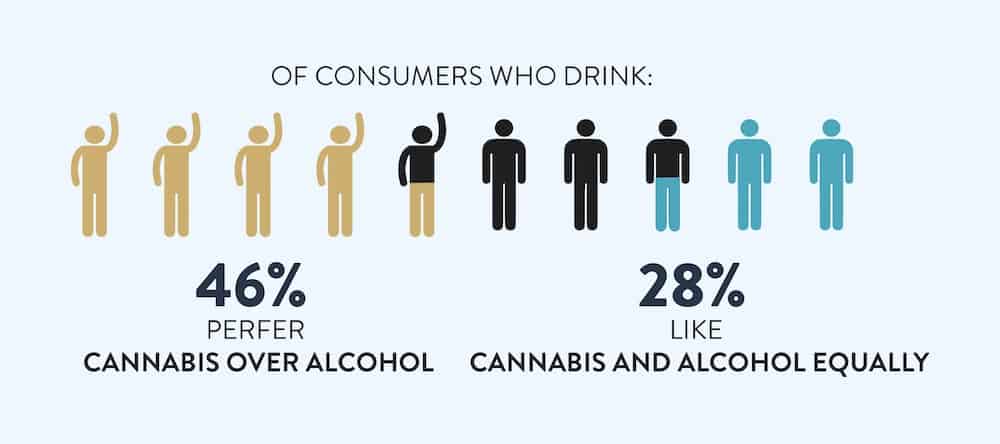
This article originally appeared in the March 2019 issue. For subscription services, click here.
Beer has had a long ride as the unofficial drink of St. Patrick’s Day, but proponents of cannabis-infused beverages think that change is coming.
Last October, Molson Coors CEO Mark Hunter estimated that the cannabis market could total $7 billion to $10 billion in Canada alone, and that nonalcoholic cannabis-infused beverages could account for as much as $3 billion, or 30 percent of that total market. Molson Coors had already struck a joint venture two months earlier with the Quebec-based cannabis brand HEXO.
A year before, Constellation Brands created a very loud buzz by announcing its investment in Canopy Growth Corp., acquiring 9.9 percent of the Canada-based company. It signaled a very public entrance by a Big Alcohol player into the cannabis industry. Equating to a 10 percent (US $195 million) investment stake in Canada’s largest LP, the move excited industry stakeholders about large, well-capitalized companies taking the cannabis space seriously.
With its major beer division based in Chicago, Constellation Brands has said that it would not be selling any cannabis products in the United States until it was “legally permissible at all government levels,” while adding that it intends to “meet and stay ahead” of new consumer trends.
Heineken-owned Lagunitas Brewing Company, meanwhile, has already been distributing Hi-Fi Hops, its beer-styled sparkling water, in California. While it lacks alcohol, carbs or calories, each 12-ounce can (retailing for $8 apiece) features 10 milligrams of THC. Blue Moon founder Keith Villa, through his company Ceria Beverages, is also making a concerted effort in Colorado to produce
nonalcoholic beverages featuring various levels of THC.
The CEO of Coca-Cola was wary about entering the space given the lack of research and validity about the legitimacy, safety, and daily consumable quotient of cannabis-infused drinks, whether THC or CBD. Nevertheless, Coca-Cola is still planning to incorporate CBD in some beverages. For its part, Pepsi has announced no plans with cannabis, but given its established wellness product line (e.g., its Naked Juice and KeVita kombucha drinks) it would seem unlikely to cede the segment to its archrival.
Furthermore, according to Beverage Digest, US soda sales dropped for 12 consecutive years from 2004 to 2016. As consumers seek healthier products, the global health-and-wellness food
market is expected to climb by nearly 15 percent, from $707 billion in sales in 2016 to $811 billion by 2021.

And while much is yet to be determined in the segment, there are some reliable indications to cheer would-be customers.
Cannabis-infused beverages—and specifically nonalcoholic drinks—can transform the edibles market. One frequently cited complaint about edibles is their delayed post-consumption onset of a high. Since edibles are processed through the gastrointestinal system rather than through the pulmonary system (as when smoked or vaped), the onset of the psychoactive effects can take 30 to 60 minutes compared with the nearly instantaneous effect of smoked cannabis. That lag has been one of the primary reasons for consumer resistance to edibles—especially among consumers such as pain patients, who might be seeking a more immediate effect. Still, several companies are working aggressively to develop infused beverage products with uptake times of 15 minutes or less.
An alternative to drinking: In an October 2018 survey by New Frontier Data, nearly half (45 percent) of cannabis consumers who also drink said they intend to replace at least some of their alcohol use with cannabis in the future. For those who like the taste but worry about the health effects of alcohol, nonalcoholic cannabis-infused beer and wines will likely be intriguing potential replacements.
One way to achieve replacement status is through microdosing to match an equivalent alcohol intake. By infusing beverages with low doses of THC, consumers will be able to ingest the beverage at a pace comparable to beer- and wine-drinking. Finding a 1:1 parity of alcohol to cannabis-infused beverages is the focus of much investment and research as it will enable much easier education on how to consume cannabis beverages, especially for experienced alcohol drinkers.
With hangovers being one of the oft-cited downsides of consuming alcohol, a nonalcoholic cannabis-infused beverage will likely appeal to drinkers who are concerned about comparative health effects.
So by all means, raise your glasses this month and slainte! Just take note that the days of green beer
may be over even sooner than you thought.
The post Potable Pot: Cannabis Infused Beverages appeared first on High Times.


Comments
Comments are disabled for this post.